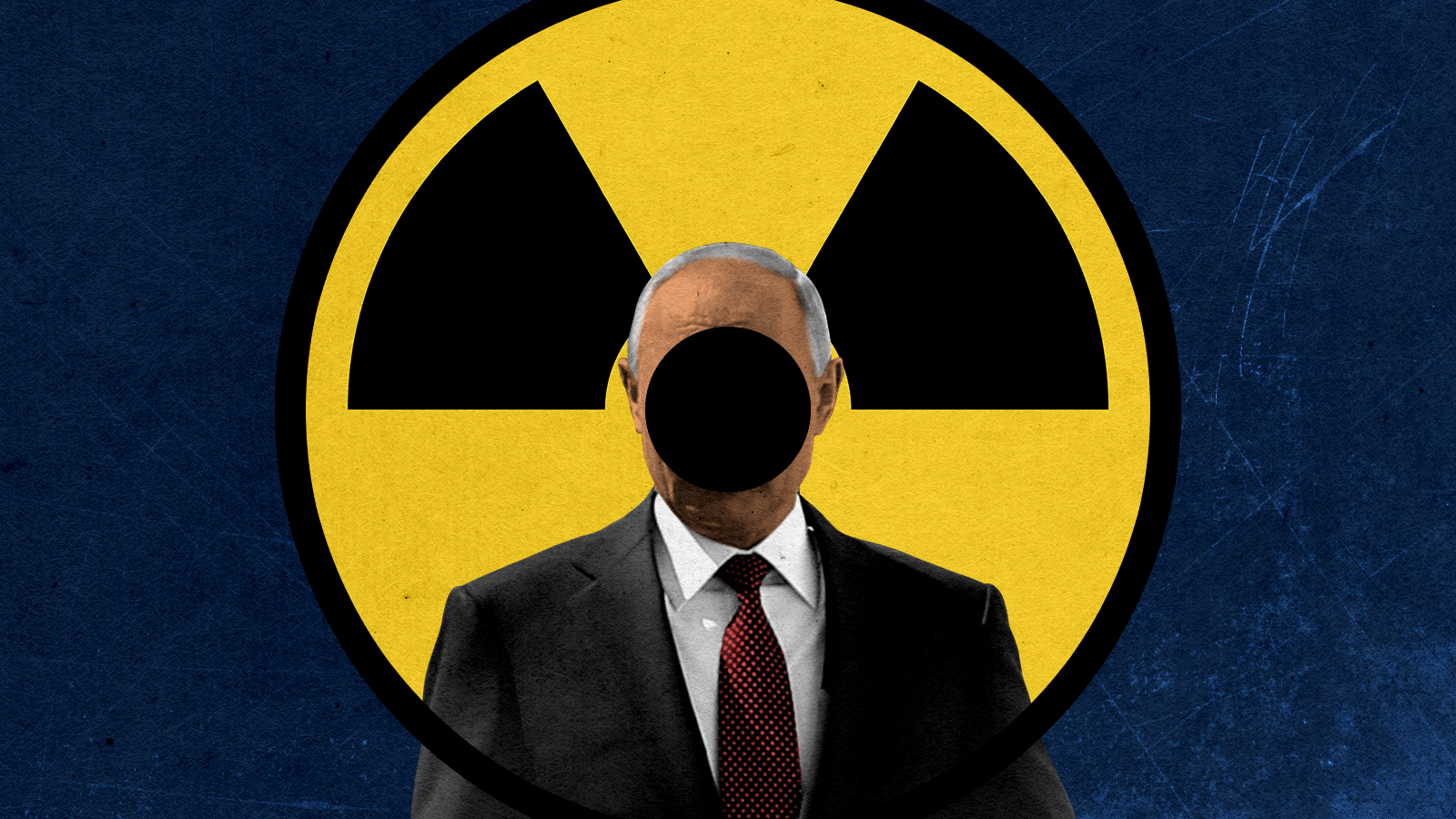What would actually happen if Putin hit Ukraine with tactical nukes?
The nuclear and geopolitical fallout, explained


Russian President Vladimir Putin has raised the specter of a nuclear attack on Ukraine several times since invading the country in February 2022. Those threats grew more frequent as Ukraine started beating Russia on the battlefield, and Europe and the U.S. stepped up their military assistance to Kyiv. Putin's illegal annexation of an area of eastern and southern Ukraine roughly the size of Portugal raised the risks, since Russia — and Russia alone — now considers those areas part of the Russian Federation.
The humiliating setbacks in Putin's war, combined with a botched and unpopular military draft, have prompted broad discontent up and down Russian society and open sparring on state-controlled TV. The pressure building on Putin is raising concerns in the West that he may actually use a low-yield tactical nuke in Ukraine — and in fact, at least two prominent and powerful pro-war figures, Chechen leader Ramzan Kadyrov and Wagner financier Yevgeny Prigozhin — have openly advocated this path.
What would actually happen if Russia resorts to nuclear warfare in Ukraine? Here's a look at what Putin would lose and gain, how the West might respond, and how bad it would be for Ukraine.
The Week
Escape your echo chamber. Get the facts behind the news, plus analysis from multiple perspectives.

Sign up for The Week's Free Newsletters
From our morning news briefing to a weekly Good News Newsletter, get the best of The Week delivered directly to your inbox.
From our morning news briefing to a weekly Good News Newsletter, get the best of The Week delivered directly to your inbox.
What kind of nuclear weapon might Putin use?
Putin has lots of options on hand. "Great secrecy surrounds Russia's arsenal of tactical arms, but they vary in size and power," and there are believed to be about 2,000 such weapons at Putin's disposal, The New York Times reports. "For months now, computer simulations from the Pentagon, American nuclear labs, and intelligence agencies have been trying to model what might happen and how the United States could respond" if Putin nukes Ukraine, but that's "no easy task" given the sizes and varieties of Russia's arsenal.
Most of Russia's tactical nukes have "a small fraction of the destructive power of the bombs the United States dropped on Hiroshima and Nagasaki in 1945," the Times reports. But "the weapon Europeans worry the most about is the heavy warhead that fits atop an Iskander-M missile and could reach cities in Western Europe. Russian figures put the smallest nuclear blast from the Iskander payload at roughly a third of the Hiroshima bomb's explosive power."
Russia could also fire a smaller nuclear weapon in a six-inch artillery shell, and its targets could range from a Ukrainian military base or concentration of troops to a small city. Of course, even a small nuclear explosion would be devastating to any affected area.
Would it turn the tide of the war back in Russia's favor?
No, using tactical nukes would "be a massive gamble for limited gains that would not achieve Putin's stated war aims," the Institute for the Study of War (ISW) think tank writes. "At best, Russian nuclear use would freeze the front lines in their current positions and enable the Kremlin to preserve its currently occupied territory in Ukraine." But for even those limited gains, "Putin would likely need to use multiple tactical nuclear weapons," ISW says, and that "would raise the risks of Western retaliation" and the costs Russia would inevitably bear.
A free daily email with the biggest news stories of the day – and the best features from TheWeek.com
Also, "it's difficult to use the battlefield tactical nuclear weapons effectively, especially against a mobile Ukrainian force," retired Gen. Wesley Clark, the former supreme allied commander of NATO forces in Europe, tells CNN. "We've done it in exercises for years in the United States military during the Cold War, and found that it's a lot more difficult problem than it looks like on paper. Even with, like, 10 kiloton warheads, the area of destruction is relatively small, the likelihood of missing is relatively high, you create a helluva mess — excuse me, a big mess in the country, but it may not have the military significance that he thinks."
Russia could also drop several tactical bombs "in a nuclear terror attack against one or more major Ukrainian population centers or critical infrastructure in hopes of shocking Ukraine into surrender or the West into cutting off aid to Ukraine," ISW notes. But it's pretty clear by now that "such attacks would be highly unlikely to force Ukraine or the West to surrender," and it would be a "tremendous gambles of the sort that Putin has historically refused to take."
What kind of nuclear fallout would there be from a small-yield nuke?
"How much destruction — and lingering radiation — would result" from a tactical nuclear strike "depends on factors including the size of the weapon and the winds," the Times explains. "But even a small nuclear explosion could cause thousands of deaths and render a base or a downtown area uninhabitable for years." There's really "only one dramatic, real-life comparison on Ukrainian soil," the Chernobyl nuclear reactor meltdown, the Times adds, and as with that 1986 disaster, if the winds blow east, "the radiation released by Russian weapons could easily blow back into Russian territory."
The truth is "we can't predict the physical consequences of such an attack confidently," writes Edward Geist, a policy researcher at the RAND Corporation. "What we think of as 'nuclear weapons effects' such as blast and fallout are incredibly complicated physical phenomena that result from the interaction of the radiation and materials emitted by the detonating weapon with the matter in the surrounding environment."
The models we do have are based on limited data from Cold War–era atmospheric nuclear weapons tests, and "these models could potentially be extremely misleading and fail to predict catastrophic collateral effects," Geist explains. The best modeling we have suggests that even if the nuclear weapons were detonated at a "safe" height, they would probably create their own cloud system and rain down radioactive drops, creating "disastrous radiological contamination on the ground."
What about the geopolitical fallout?
If Putin uses nuclear weapons in Ukraine, Russia "could become an international pariah, and the West would try to capitalize on the detonation to try to bring China and India, and others who are still buying Russian oil and gas, into sanctions they have resisted," the Times reports. China and India have already publicly signaled their unease with Putin's Ukraine war, and if they and other neutral-to-friendly large nations stop buying Russian oil, Russia's economy would collapse.
"The 77-year-old tradition of nuclear nonuse — the nuclear taboo — is the single most important accomplishment of the nuclear age," Brown University political scientist Nina Tannenwald writes in Scientific American. "It is a primary obligation of leaders today to make sure nuclear weapons are never used again. Putin and Russian Foreign Minister Sergey Lavrov should stop threatening nuclear weapons. Other leaders should express shock and outrage, and make it clear that nuclear threats are irresponsible and unacceptable."
How would the U.S. and Europe respond?
U.S. National Security Adviser Jake Sullivan said publicly that the Biden administration has made it clear to Russia it would face unspecified catastrophic consequences if it uses nuclear weapons in Ukraine. That response wouldn't have to involve nuclear weapons, retired Gen. David Petraeus told ABC's This Week. Hypothetically, the U.S. and NATO "would take out every Russian conventional force that we can see and identify on the battlefield in Ukraine and also in Crimea and every ship in the Black Sea."
The U.S. would, ideally, show Putin that the West is prepared to respond by readying air power in nearby NATO countries, Clark told CNN. "Taking out those troops, those Russian troops on the ground, is tough. We could take out Russian maritime assets, we could go after certain logistics and control points, but it would be a big, big deal for the United States."
It's worth mentioning that Putin has threatened to use tactical nukes on various countries since at least 2014, Tannenwald notes. "Putin likes to wave about his nuclear weapons as a reminder to the West (and perhaps to himself) that Russia is still a great power." Still, for all his insinuations, "Putin did not directly articulate any new red lines or overtly threaten to use a nuclear weapon against Ukraine if Ukrainian counteroffensives continue," ISW underscores.
Putin could reach a point of desperation where he uses a tactical nuclear weapon in Ukraine, but he's most likely just saber-rattling, and "he likely incorrectly assesses that his nuclear brinksmanship will lead the United States and its allies to pressure Ukraine to negotiate," ISW assesses. "The more confident Putin is that nuclear use will not achieve decisive effects but will draw direct Western conventional military intervention in the conflict, the less likely he is to conduct a nuclear attack."
Updated Jan. 25, 2023: This article has been updated throughout to reflect recent developments.
Peter has worked as a news and culture writer and editor at The Week since the site's launch in 2008. He covers politics, world affairs, religion and cultural currents. His journalism career began as a copy editor at a financial newswire and has included editorial positions at The New York Times Magazine, Facts on File, and Oregon State University.
-
 The mission to demine Ukraine
The mission to demine UkraineThe Explainer An estimated quarter of the nation – an area the size of England – is contaminated with landmines and unexploded shells from the war
-
 The secret lives of Russian saboteurs
The secret lives of Russian saboteursUnder The Radar Moscow is recruiting criminal agents to sow chaos and fear among its enemies
-
 Is the 'coalition of the willing' going to work?
Is the 'coalition of the willing' going to work?Today's Big Question PM's proposal for UK/French-led peacekeeping force in Ukraine provokes 'hostility' in Moscow and 'derision' in Washington
-
 Ukraine: where do Trump's loyalties really lie?
Ukraine: where do Trump's loyalties really lie?Today's Big Question 'Extraordinary pivot' by US president – driven by personal, ideological and strategic factors – has 'upended decades of hawkish foreign policy toward Russia'
-
 What will Trump-Putin Ukraine peace deal look like?
What will Trump-Putin Ukraine peace deal look like?Today's Big Question US president 'blindsides' European and UK leaders, indicating Ukraine must concede seized territory and forget about Nato membership
-
 Ukraine's disappearing army
Ukraine's disappearing armyUnder the Radar Every day unwilling conscripts and disillusioned veterans are fleeing the front
-
 Cuba's mercenaries fighting against Ukraine
Cuba's mercenaries fighting against UkraineThe Explainer Young men lured by high salaries and Russian citizenship to enlist for a year are now trapped on front lines of war indefinitely
-
 Ukraine-Russia: are both sides readying for nuclear war?
Ukraine-Russia: are both sides readying for nuclear war?Today's Big Question Putin changes doctrine to lower threshold for atomic weapons after Ukraine strikes with Western missiles



